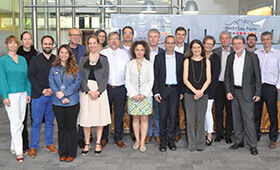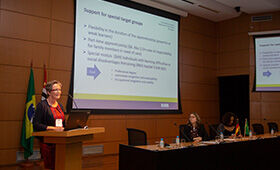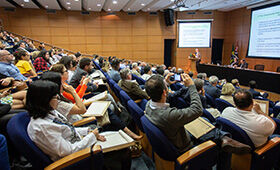German-Brazilian symposium on the topic of digitalisation in São Paulo
The 7th German-Brazilian dialogue on Science, Research and Innovation took place from 30 to 31 October 2018 with the theme “Working and Learning in a Digital World”. Around 200 participants from business, academia and policy making discussed developments around the topic of digitalisation. The Federal Institute for Vocational Education and Training (BIBB) was also involved in the dialogue.
The event organiser was the German Centre for Research and Innovation (DWIH) in São Paulo. With its university representatives and German research funding bodies, the DWIH acts as the flagship of the German higher education and research sector in São Paulo - the key centre for science. The purpose of the bilateral organisation is to network and to search for new solutions and synergies in the mutual interest of both countries. The host of this years’ event was the FAPESP (Fundação de Amparo à Pesquisa do Estado de São Paulo). The FAPESP is one of the largest public organisations for the funding of research in Brazil. The event was opened by Axel Zeidler, Consulate General of the Federal Republic of Germany in São Paulo.
In her talk entitled “Leaving nobody behind on the way to a digital world of work”, Dr. Monika Hackel from BIBB highlighted the particular opportunities and challenges of digitalisation for specific target groups. She outlined current efforts underway in Germany, using training support tools both at individual as well at company level, to contribute to the inclusion of different target groups in the training market. She emphasized the importance of the accessible design of digital tools and the (analogue) support needed for companies in the training and employment of people with disabilities. The basis of this was the data from the occupation screenings implemented as part of BIBB-BMBF Initiative “VET 4.0 - Qualifications and competencies of skilled workers for the digitalised work of tomorrow”. In this case, respondents showed themselves to be more cautiously optimistic when assessing whether digitalisation would tend to offer more opportunities or risks for people with disabilities.
The general tenor of the event was that digitalisation represented a social organisational task which had to be actively addressed in the interests of all members of society. Digital learning provision has a key role to play in this in order to ensure broad-based social participation. The event also demonstrated the differing levels of technological development in both countries and the desire for partnership-based collaboration. This also provides further organisational scope for research and development, particularly the area of international dialogue. To conclude, it can certainly be said that the German-Brazilian dialogue created a successful framework for the development of further working contexts.


